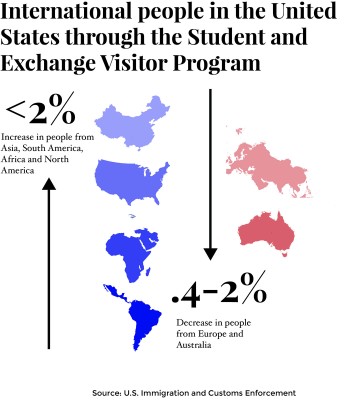
There has been a 14.18 percent increase in international students enrolled at U.S. schools compared to numbers from January 2014, according to a March 25 report from the U.S. Immigration and Customs Enforcement.
The report, using data from the Student and Exchange Visitor Information System, tracks the number of students participating in ICE’s Student and Exchange Visitor Program. SEVP manages academic and vocational visa classifications for nonimmigrant students while the U.S. Department of State manages J visas for exchange programs, the report stated.
Approximately 76 percent of all international students enrolled in the United States come from Asian nations and 24 percent are from all other nations combined, the report stated. Since October 2014, there has been a 2 percent increase in students from Asia, primarily from China and India.
Carissa Cutrell, public affairs officer for SEVP, said her department oversees SEVP-certified schools that enroll international students and manages the SEVIS database that contains information on all international students in the United States.
“If an international student is coming here to study, they can only attend certain universities, undergraduate programs or primary schools,” she said. “All those schools, in order to enroll international students, have to be certified by the Student and Exchange Visitor Program, which is the government program that is managed by U.S. Immigration and Customs Enforcement. There is a whole certification process that takes place to ensure those schools are bona fide.”
Certified schools must also have a designated official to assist with the process of enrolling the international student into the U.S. institution, Cutrell said.
Boston University spokesman Colin Riley said enrollment from international students is growing steadily due to the quality of higher education the school offers.
“[This] reinforces what BU is known for, and that is you are going to be in class with someone maybe a different background, different state, different part of the world, different upbringing,” he said. “They’re going to bring their knowledge and experience and culture with them, and it will contribute to the quality of education that’s going on in the classroom. Certainly, those classrooms [are] where those perspectives are beneficial.”
The International Students and Scholars Office, a part of BU’s Global Programs, works to advance the university’s “global strategy,” said Managing Director Jeanne Kelley.
“Increased interest in U.S. universities from international students presents great opportunities, along with some challenges,” she wrote in an email. “But the net impact is indisputably positive. Every one of us, in the broader academic community and even all of Boston, benefits from the rich diversity of perspectives and experiences these students bring from their home cultures.”
Total enrollment from international students increased by 10.6 percent in fall 2014 and 7.3 percent in fall 2013, Kelley said. This growth aligns with the increased number of students calculated from the SEVIS, she said.
Yuxuan Liu, a sophomore in the College of Communication from China, said the United States provides international students with a diverse cultural experience.
“BU has a really dynamic culture,” he said. “It doesn’t stick to one culture. I know for some universities, they don’t have [many] international students, but they do have many types of people … It is important to see every type of culture.”
Pablo Amor, a freshman in the College of Engineering from Spain who has also lived in Belgium, said the number of international students at BU was a factor in his decision to attend the university.
“There’s a good amount [of international students], and that’s really something I looked into before coming to BU,” he said. “I know people who came to U.S. and to places with a lot less international people, and it was a big culture shock. There’s a bigger diversity of people [here].”
Elif Yildirim, a sophomore in the College of Arts and Sciences from Turkey, said BU’s large pool of international students creates a diverse atmosphere.
“[Because Americans speak English fluently], I would feel uncomfortable,” she said. “I would be taking the same classes as them. I don’t know why, but it makes me feel inferior sometimes, but when I take classes with other international students too, I feel much more comfortable. We help each other out sometimes because we understand each other’s problems.”























































































































